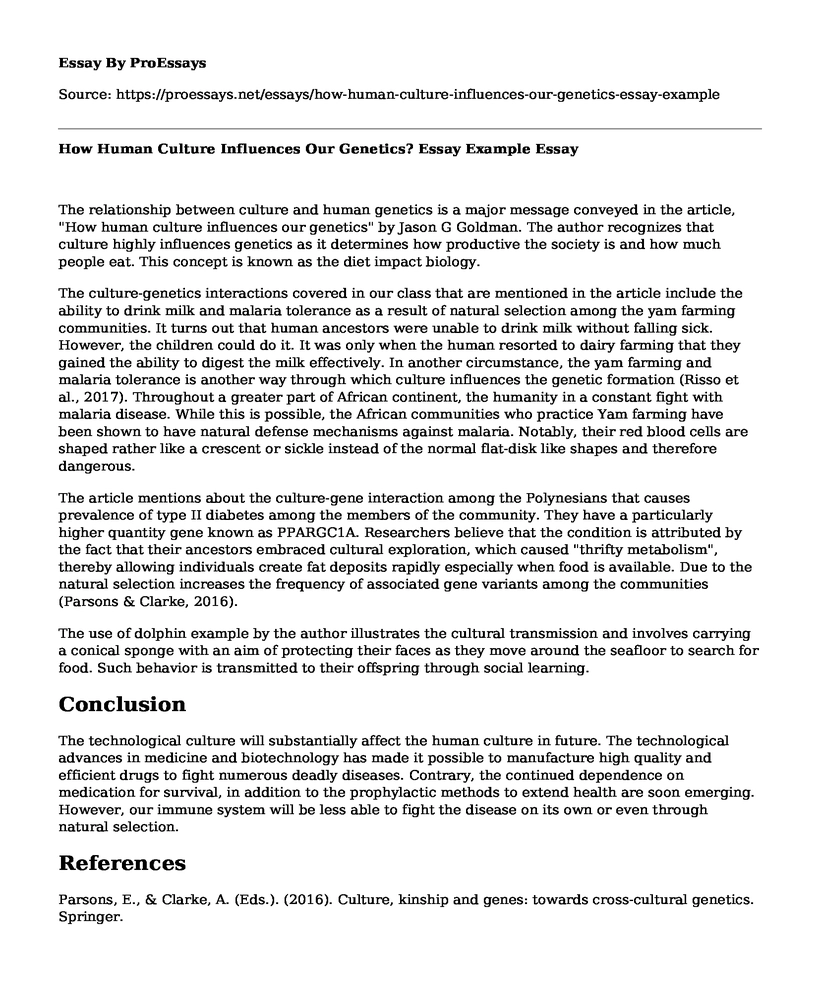The relationship between culture and human genetics is a major message conveyed in the article, "How human culture influences our genetics" by Jason G Goldman. The author recognizes that culture highly influences genetics as it determines how productive the society is and how much people eat. This concept is known as the diet impact biology.
The culture-genetics interactions covered in our class that are mentioned in the article include the ability to drink milk and malaria tolerance as a result of natural selection among the yam farming communities. It turns out that human ancestors were unable to drink milk without falling sick. However, the children could do it. It was only when the human resorted to dairy farming that they gained the ability to digest the milk effectively. In another circumstance, the yam farming and malaria tolerance is another way through which culture influences the genetic formation (Risso et al., 2017). Throughout a greater part of African continent, the humanity in a constant fight with malaria disease. While this is possible, the African communities who practice Yam farming have been shown to have natural defense mechanisms against malaria. Notably, their red blood cells are shaped rather like a crescent or sickle instead of the normal flat-disk like shapes and therefore dangerous.
The article mentions about the culture-gene interaction among the Polynesians that causes prevalence of type II diabetes among the members of the community. They have a particularly higher quantity gene known as PPARGC1A. Researchers believe that the condition is attributed by the fact that their ancestors embraced cultural exploration, which caused "thrifty metabolism", thereby allowing individuals create fat deposits rapidly especially when food is available. Due to the natural selection increases the frequency of associated gene variants among the communities (Parsons & Clarke, 2016).
The use of dolphin example by the author illustrates the cultural transmission and involves carrying a conical sponge with an aim of protecting their faces as they move around the seafloor to search for food. Such behavior is transmitted to their offspring through social learning.
Conclusion
The technological culture will substantially affect the human culture in future. The technological advances in medicine and biotechnology has made it possible to manufacture high quality and efficient drugs to fight numerous deadly diseases. Contrary, the continued dependence on medication for survival, in addition to the prophylactic methods to extend health are soon emerging. However, our immune system will be less able to fight the disease on its own or even through natural selection.
References
Parsons, E., & Clarke, A. (Eds.). (2016). Culture, kinship and genes: towards cross-cultural genetics. Springer.
Risso, D. S., Giuliani, C., Antinucci, M., Morini, G., Garagnani, P., Tofanelli, S., & Luiselli, D. (2017). A bio-cultural approach to the study of food choice: The contribution of taste genetics, population and culture. Appetite, 114, 240-247.
Cite this page
How Human Culture Influences Our Genetics? Essay Example. (2022, Nov 06). Retrieved from https://proessays.net/essays/how-human-culture-influences-our-genetics-essay-example
If you are the original author of this essay and no longer wish to have it published on the ProEssays website, please click below to request its removal:
- Essay Sample on Ideologies of Supporting Family
- Essay on Latinx Identity In Hegemonic U.S.A
- Culturally Responsive Instruction in U.S Schools: Essential for a Diverse Society
- Pop Culture: Unifying Agent in Socialization - Essay Sample
- Essay Example on Ivory Trade: Destruction of Africa & Elephants
- Exploring the National Park: A Memorable Adventure - Essay Sample
- Child Maltreatment - Report Sample







